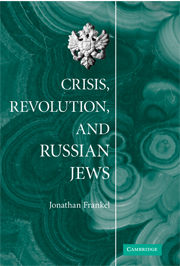Book contents
- Frontmatter
- Contents
- Acknowledgments
- Introduction
- PART I NEW DYNAMICS?
- 1 Crisis as a Factor in Modern Jewish Politics, 1840 and 1881–1882
- 2 Jewish Politics and the Press: The “Reception” of the Alliance Israélite Universelle (1860)
- PART II REVOLUTION AND WAR (1905–1921)
- PART III IDEOLOGICAL CONFLICT AND CONTINUITY
- PART IV OVERSEAS
- PART V HISTORY AND THE HISTORIANS
- Index
1 - Crisis as a Factor in Modern Jewish Politics, 1840 and 1881–1882
Published online by Cambridge University Press: 07 August 2009
- Frontmatter
- Contents
- Acknowledgments
- Introduction
- PART I NEW DYNAMICS?
- 1 Crisis as a Factor in Modern Jewish Politics, 1840 and 1881–1882
- 2 Jewish Politics and the Press: The “Reception” of the Alliance Israélite Universelle (1860)
- PART II REVOLUTION AND WAR (1905–1921)
- PART III IDEOLOGICAL CONFLICT AND CONTINUITY
- PART IV OVERSEAS
- PART V HISTORY AND THE HISTORIANS
- Index
Summary
The crises created by acts of Judeophobic, antisemitic aggression played a crucial role in the history of the Jewish people during the nineteenth century. A direct challenge to the security of the Jews in one country or another could not go unanswered, especially when, as was so often the case, it came in times of peace and relative tranquillity. The Jews had to respond in some way. But how to interpret the challenge, how best to react, were questions of the highest complexity; and the answers varied radically according to time and place.
After all, so long as they lived their lives in the Diaspora, scattered and essentially landless minorities, the Jews as a collectivity did not have to face the tests regularly imposed on sovereign nations by war or revolution. Of course, such all-engulfing eruptions caught up Jews and Jewish communities, often with far-reaching results, but only as parts within a greater whole. In contrast, events such as the Damascus blood libel of 1840, the Mortara case of 1858, the recurring anti-Jewish excesses in Rumania during the 1870s, the pogroms of 1881–82, the expulsion from Moscow ten years later, and the Dreyfus Affair involved the Jews, first and foremost, precisely as Jews, as a collective entity. It is this fact that lends these episodes their unique importance for the historian of modern Jewry.
- Type
- Chapter
- Information
- Crisis, Revolution, and Russian Jews , pp. 15 - 31Publisher: Cambridge University PressPrint publication year: 2008
- 1
- Cited by



